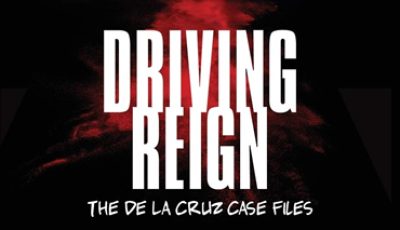

Driving Reign by TG Wolff
 Sophie DeMusa had plans. Finish college. Go to med school. Save the world. She never planned to be in a hospital bed, in a coma after ingesting too many pills. The homicide detective standing over her didn’t plan to be there either. After all, she wasn’t dead.
Sophie DeMusa had plans. Finish college. Go to med school. Save the world. She never planned to be in a hospital bed, in a coma after ingesting too many pills. The homicide detective standing over her didn’t plan to be there either. After all, she wasn’t dead.
Detective Jesus De La Cruz was ready to turn away from the sad story of a suicide attempt. When his AA sponsor, Dr. Oscar Bollier, pressed, Cruz begrudgingly agreed to investigate. It should have been an open-and-shut case.
Except, if it was suicide, why were there two different 911 calls?
As Cruz digs into the weeks and months before Sophie’s hospitalization, he unearths a twisted knot of reality and perception. A sex scandal, a jilted lover, a callous director, a rainmaker, and a quid pro quo all made decisions and took actions that affected Sophie’s life. But did one of them try to kill her? The facts have Cruz questioning if there is such a thing as an innocent man.
Truth is a strong rope, tied in a noose. As he closes in, the knot tightens, but who will pay the price? A killer or a member of Cruz’s own family?
Author T G Wolff spent some time with The Big Thrill discussing the second installment in the De La Cruz Case Files series, DRIVING REIGN:
No spoilers, but what can you tell us about your book that we won’t find in the jacket copy or the PR material?
Although the story opens with Sophie DeMusa in a hospital bed, she is not the dead body in the story. She was supposed to be. I tried killing her three times and she kept finding a way to persevere through. I think her tenacity is something that crime survivors have in common and need to develop to move beyond the past, to live life moving forward. What is a mystery writer to do when their victim won’t die? I had to kill somebody else.
What authors or books have influenced your career as a writer, and why?
The first author that influenced me was Rex Stout. His Nero Wolfe series were the first mysteries I loved. I was influenced by the way he didn’t write violence or bloodshed that wasn’t center to the story. That comes across in my book. The reader doesn’t see the murders and doesn’t need to. The story is about the people—cops, victims, and killers.
I was also influenced by Harper Lee’s To Kill a Mockingbird. The simple language was easy to digest and her characters were real, flaws and all. Atticus Finch’s manner and style are notable because he is not a Type A personality. The loud ones can be easy and fun to write. The thoughtful ones take work.
How does this book make a contribution to the genre?
Mysteries and thrillers have often explored social constraints without explicitly being a social commentary. Through Detective Jesus De La Cruz, DRIVING REIGN shows the overt and subtle ways some people in a position of power work to control that power and their legacy. Every time a blind eye is turned or a line blurred, a new victim is made. It’s easy to accept as simply “how things are” when it’s a stranger; it’s another thing when it’s someone you know.
What do you hope readers will take away from this book?
I hope readers take away the shadow of a doubt that enables people to think critically about real-life news stories put in front of us and ask hard questions. We are bombarded with facts and the spin on facts. Nothing, it seems, is wholly true or wholly lie. It’s up to each of us to sort through the minutiae and make sound decisions.
Was there anything new you discovered, or that surprised you, as you wrote this book?
I was surprised how much of my own experiences as a female working in a male-dominated industry were used to inspire the unfairness levied on De La Cruz. I don’t have a #MeToo story thanks to the literally thousands of men I have worked with over my career as a civil engineer. Yet, when I needed to compromise Cruz, I found myself reaching into my own past and finding those building blocks. Cruz’s reaction, at least initially, mirrored my own. I didn’t (and don’t) have the energy to stay angry. I rather spend my time being productive and useful.
*****
T G Wolff writes thrillers and mysteries that play within the gray area between good and bad, right and wrong. Cause and effect drive the stories, drawing from 20+ years’ experience in civil engineering, where “cause” is more often a symptom of a bigger, more challenging problem. Diverse characters mirror the complexities of real life and real people, balanced with a healthy dose of entertainment. T G Wolff holds a master’s degree in civil engineering and is a member of Mystery Writers of America and Sisters in Crime.
To learn more about the author and her work, please visit her website.
- ITW Presents: The Breakout Series - April 25, 2024
- The Big Thrill Recommends: THE GARDEN GIRLS by Jessica R. Patch - April 25, 2024
- The Big Thrill Recommends: AN INCONVENIENT WIFE by Karen E. Olson - April 25, 2024

